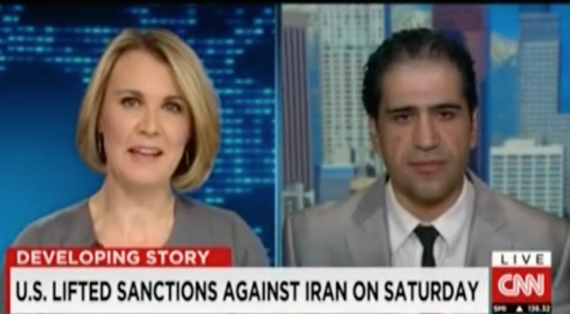During recent political campaigns, Iranian candidates from various political parties discussed the economy, inflation, unemployment, engagement with the West and the nuclear deal. The candidates came from three political camps - reformist, hardliners (including the principalists), the moderates, and some independents.
Nevertheless, there was one crucial issue missing from the political campaigns; Iran's intervention in the Syrian civil war which has contributed in millions of refuges and a death toll of over 450,000. The public did not appear to question Iran's role in Syria either.
Iran in Syria
Iran's engagement in the Syrian civil war should have been a crucial issue in the election campaigns for several reasons. First of all, Shiite Iran is hemorrhaging billions of dollars on the Alawite state to keep Bashar Al-Assad in power.
The Iran Revolutionary Guard Corps (IRGC) and its elite branch the Quds Force, which operates in foreign countries, have increased the number of Iranian troops in Syria in order to dominate the political, military and security apparatuses of the Syrian government. The number has grown substantially in the last few months since Russia's military joined the Iranian forces in support of Assad.
The public funerals of Iranian soldiers killed in Syria are increasing all over the country. Iran is now investing on deploying new special operations from the Saberin commandos of the IRGC Ground Force.
IIRGC senior cadres have also turned to training, financing, and creating other Shiite militia groups in the region including "Katayeb Hezbollah", "Imam Ali Battalions", "Al-Nojaba Movement", the "Badr Corps", "Asaeb Ahl al-Haq", "Abolfazl Brigade", "Khorassani Brigades", and Hezbollah, to name a few.
The red lines
The fact that no Iranian politician has criticized Iran's military, financial, intelligence and advisory involvement in the Syrian civil war suggests that there exist no differences among the factions of various Iranian political camps on Syria.
In addition, Syria is the red line that reformist, moderates, or independents do not dare to cross. Iran's supreme leader, Ayatollah Ali Khamenei, has repeatedly made it clear that the Islamic Republic will not abandon the Alawite state. Recently, He described Iran's role in Syria as the fight between Islam and Kufr (disbelief).
"The door for martyrdom, which was closed by the end of the Iranian-Iraqi war, is now open in Syria... Youth have persistently called for going to the battlefield in Syria, where Islam is fighting kufr as was the case during the Iranian-Iraqi war."
It follows that any political candidate daring to question Iran's involvement in Syria will be indeed standing against Mr. Khamenei who enjoys the final say in Iran's foreign policy. This will basically trigger the end of that political candidate's career since the office of the supreme leader has major control over the political process.
In addition, IRGC leaders have already consolidated their power in Syria making it clear that there exists no change of plans for Syria. Anyone who opposes their agenda will run the risk of standing against this military empire and powerful hard line organization which wields significant influence in other decisive hard line institutions such as the Judiciary, the Ministry of Intelligence (etela'at), the office of the supreme leader, and the Guardian Council.
Furthermore, Iranian leaders and state-controlled media outlets have created a powerful narrative for Syria, aiming to impose fear in the public. Their argument is that if the Islamic Republic does not support the Syrian government, radical Islamist Sunni groups such as ISIS and Jubhat Al-Nusra will take control over the region, endangering the lives of Shiite communities and Iranians both at home and abroad. Hence, any candidate who opposes Iran's engagement in Syria would be aligning himself or herself on the side of ISIS and terrorist groups.
Finally, Iranian politicians across the political spectrum do share the same nationalistic and ethnic objectives when it comes to Iran's hegemonic ambitions and pursuit of regional pre-eminence and supremacy. From their perspective, abandoning the Alawite government will result in empowerment of Sunni in Syria which will tip the balance of power in favor of Arab states and against Iran.
The unison among Iran's reformists, hardliners, principalists, moderates, and independent politicians will continue to last due to the above factors and their shared convergence of interests in keeping Assad in power.
--
Dr. Majid Rafizadeh is an American political scientist, business advisor and the president of the International American Council on the Middle East. Harvard-educated, Rafizadeh serves on the advisory board of Harvard International Review. An American citizen, he is originally from Iran and Syria, lived most of his life in Iran and Syria, till recently. He is a board member of several influential international and governmental institutions, quoted on national and international outlets, his analyses are sought by government and non-governmental organizations, and he is native speaker of Arabic and Persian, fluent in English and Dari, and can converse in French, Hebrew.
You can sign up for Dr. Rafizadeh's newsletter for the latest news and analyses on HERE.
You can also order his books on HERE.
You can learn more about Dr. Rafizadeh on HERE.
You can contact him at Dr.rafizadeh@post.harvard.edu or follow him at @Dr_Rafizadeh. This post first appeared on Al Arabiya.

